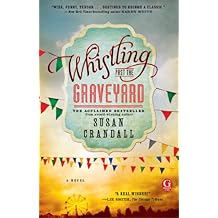 In Whistling Past the Graveyard, author Susan Crandall examines the struggle of growing up as a white girl in the deep south in the early sixties. Crandall fuels her story with the expected issues of bigotry, gender conflict and double standards, fanning the predictable flames throughout the book. I have read and re-read the same themes often, and though the themes carried the book, the story itself was compelling enough without these issues. The story might have even been more believable set in today's south or north or anywhere, really.
In Whistling Past the Graveyard, author Susan Crandall examines the struggle of growing up as a white girl in the deep south in the early sixties. Crandall fuels her story with the expected issues of bigotry, gender conflict and double standards, fanning the predictable flames throughout the book. I have read and re-read the same themes often, and though the themes carried the book, the story itself was compelling enough without these issues. The story might have even been more believable set in today's south or north or anywhere, really.Nine-year-old Starla Claudelle narrates the story with a sassy southern voice that drew me into the book early and kept me in it throughout. Deciding to hitchhike to Tennessee to find her mother in Nashville, Starla runs away from an overbearing grandmother, and her Mississippi home. The story breaks down for me when a black woman, Eula, kidnaps Starla, just after having taken a baby from the church steps in Starla's hometown. I couldn't believe Eula's naivete and boldness. Eula's actions made her character cartoon-ish, which is unfortunate because Eula's journey would have been more interesting to me than the story of young Starla.
Starla and Baby James are held captive by Eula's abusive husband. He tries to kill Starla and the baby when he finds them after their failed escape attempt.
The author develops a a rationale for Eula's actions that stretched the limits of the story. So too, Eula's husband is a stock character and a familiar villain. Starla's unreliable narration proves to be part of the problem. The reader has to guess Eula's motivation and Elua's husband's motivation seemed only to be pure meanness. Eula reads as a predictably wise and insanely foolish woman, and, while she is ultimately beloved in the story, she never beaks out of a caricature role.
Eula kills her husband by whacking him over the head with a frying pan while he is trying to choke the life out of Starla.
The scene work and tension in Eula's home reads well with high tension and drama, even though I couldn't figure out Eula's quixotic nature.
Freed from a tyrant and captivity, Eula, Starla and Baby James set out for Tennessee. Here the book compounds its use of familiar theme. An evil white man runs the trio off the road leaving them wrecked and destitute on a baking hot day in Mississippi. While the story still interested me, this is where I began to tire of familiar axes and grinds.
The remainder of the book plays out in expected ways, but Starla's journey, her emotional and spiritual development and her method of dealing with heartache made the book a decent read.
Read this book for a an entertaining fast-paced romp and enjoy Starla's snappy voice.
No comments:
Post a Comment